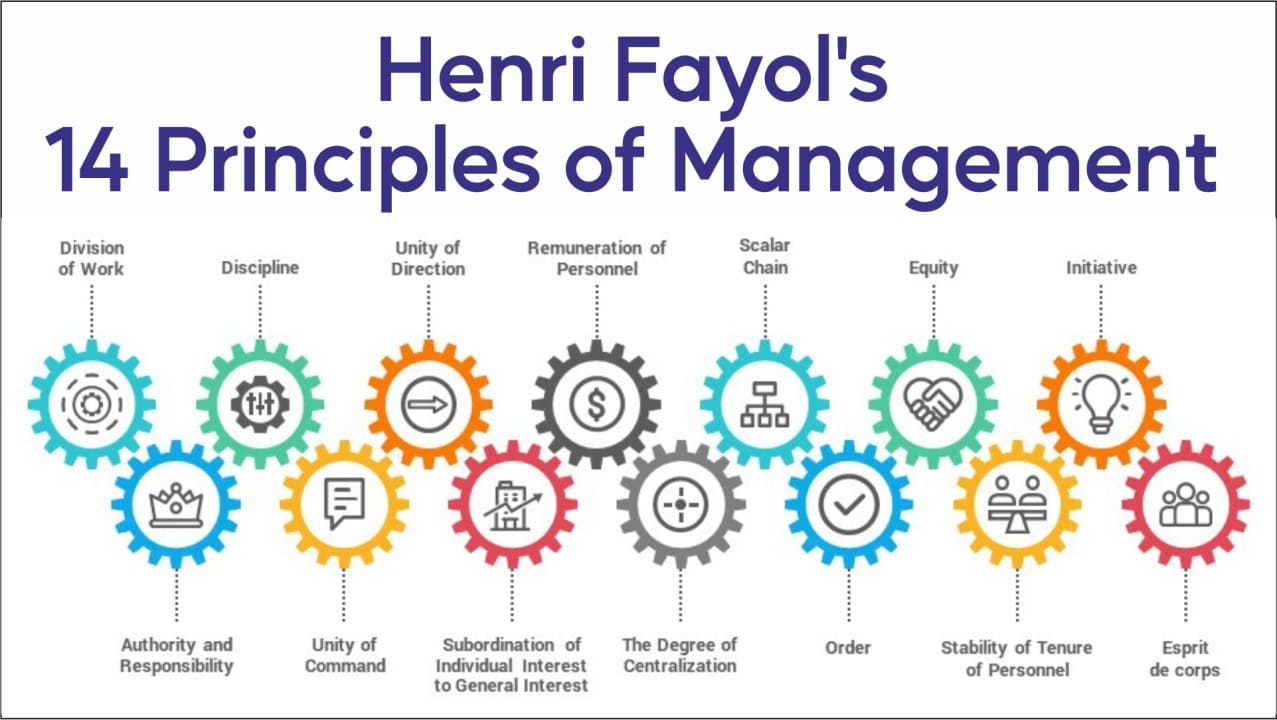14 Principles of Management by Henri Fayol Explained
Mr. Bambam Yadav / 1 days - 0
- 4 min read

Who Was Henri Fayol?
Henri Fayol was a French mining engineer known as the father of modern management theory. He started his career at the French mining company Commentry-Fourchambault and Decazeville. Here, he went through all phases from engineer to general manager. Later, he served as the organization's director from 1888 to 1918. He was not only dependent on technical skills. Skills rather focused on organisational as well as people management skills.
In the early 20th century, his theories gained huge popularity. The book named Administration Industrielle et Générale, written by him, introduced a set of principles applicable across all industries and management. The Industrial Revolution has reshaped the way in which people work. 14 principles provide a structured approach to leadership.
Henry Fayol’s 14 Principles of Management
These principles follow a top-down approach that helps managers get the best from employees and run the business smoothly. Let's look at all of them and understand them.
- Division of Work - It states that if a particular employee is given a task, then they will become more skilled and efficient. This does not support a multitasking culture. To implement tasks effectively, looking at the current skill set of an employee and assigning tasks according to that is essential. All this will make them productive, efficient as well and skilled in the long run. Example - In school, every department will have a different set of responsibilities assigned to it. This includes sports, administration, beverages, food, and sanitation. All employees specialising in a particular department take responsibility for this. By doing this efficiently, productivity will be enhanced, and they will become specialists in the long run.
- Authority - The Henry principle states that a manager should have the necessary authority to make sure that employees follow their instructions. No authority will lead to a lack of ability in getting work done. Authority should also come along with responsibility. More authority is there than responsibility then in such a case, frustration will be there among employees. But if more responsibility is there compared to the author, then the manager will be frustrated.
Example - If a particular employee is responsible for looking at the decoration department. So while planning an event, he has no such authority to make any kind of design decisions or even contact the vendors to get tasks completed. In such cases, no productivity or efficiency will be achieved.
- Discipline - To run effectively, any organisation requires discipline. A culture of mutual respect is required to get disciplined employees. Organizational rules, philosophies, and structures should be in place. Good supervision and impartial judgment will help in this.
Example - Every employee should follow all the necessary rules and regulations. This will maintain a disciplined nature at the workplace along with smooth work and great results.
- Unity of Command - A clear chain of command is necessary for an organisation. The employees should have a clear view of whose instructions they should follow. His theory states that employees should get orders from one particular manager only. Authority, discipline, and stability will be threatened if an employee works under two or three managers. Employees will feel burnout, and breakdowns will also occur in the employee structure.
Example - If an employee is allotted a task that needs to be completed within 2 - 3hours ass instructed by the supervisor. But the head of the department asks us to submit it within 1 hour. So, no unity of command will create confusion as well as pressure in the workplace.
- Unity of Direction - Henry Fayol’s principle states that work that needs to be done should be organised. Because of this, employees can work in harmony and achieve a particular objective.
Example - Different sets of activities of a company should be managed by different departments. Less confusion, as well as efficiency, will be observed due to this.
- Collective Interest Over Individual Interest - Here it says that the overall interest of the team should be in precedence compared to personal goals. Interests of the organisation should not be sabotaged by any personal interests of the individual. If this happens, then the organisation will collapse.
Example - While planning to make a team outing, the employees must make all the travel as well as stay decisions, and must make arrangements according to comfort as well as affordability.
- Remuneration - The Seventh principle of Henry Fayol’s states that employees should be given fair wages for all the work they do. The organisation that underpays workers will then struggle to retain as well as motivate workers. Both financial and nonfinancial incentives should be there in this. A structure should also be made to reward good performance and motivate employees.
Example - A company that implements a performance-based bonus structure makes sure that employees who go above and beyond get paid well.
- Centralization - This implies a concentration of powers in the hands of a particular authority. Here, the top-down approach of management is not followed, like decentralisation. Complete centralisation tells that people at the bottom have no authority. Similarly, complete decentralisation means the absence of a superior authority to control the organisation.
Example - Centralisation is quite common in small and medium enterprises. Here, delegating the work is quite minimal. The owner makes most of the decisions over here.
- Scalar Chain - Scalar Chain is a clear and concise way of communication between employees and supervisors. In the organisation hierarchy, employees should know where they stand and to whom they have to contact for the chain of command. Fayol suggests that, for this, drawing and implementing an organisation chart is necessary.
Example -.Every company has a particular hierarchy of authority that it follows. This is from. hHighestlevel of supervisors, like the CEO, to the lowest level of all subordinates. Maximum productivity can be achieved with the help of this.
- Order - An orderly placement of resources like materials, money, and manpower at the right place at the right time will be helpful. In a structured fashion, property resources can be used. Misplacement of these resources will lead to misuse and also disorder in the organisation.
Example - Planning project deadlines and budgets strategically is crucial. One can allocate resources effectively and also avoid any kind of delay due to this.
- Equity - This is simply a combination of justice and kindness. Managers should use both these with all the employees whom they manage. Loyalty and devotion will be created due to this for the organiation they work for.
Example - All employees, irrespective of religion, gender, race, and sex, must feel. Safe heard as well as seen. They should be given equal opportunity to grow and flourish in their careers.
- Stability of Tenure of Personnel - Organisation should focus on maximum efficiency and minimise staff turnover. Any new employee cannot be expected to fit into the culture right away. They should be given time to settle into their jobs and feel efficient. Both old and new employees should be assured of job security. A clear and effective method is required to handle vacancies, as training new ones takes time and expense.
Example - Alum should be given to old employees so their morale can be boosted.
- Initiative - Employees should be encouraged to show their initiative. When employees can say how best they can do their jobs, they feel motivated and respected. Organisations should listen to the concerns of all employees and encourage them to develop their development plans.
Example - The Organisation should take suggestions from employees about their department, as they feel that they are an authoritative person. They feel a sense of achieving something for the team.
- Esprit de Corps - Esprit de Corps term in simple language means “Team Spirit”. Management should focus on creating unity and employee coordination. This is the best source of strengthening the organization. Happy and motivated employees will be productive and efficient.
Example - While the new plan of action is discussed for achieving the monthly targets. Using the word “We” instead of “I” will create team spirit among the group.
Conclusion:
Henry Fayol’s 14 principles of management are accepted universally, and managers use them at work. Even though they are 100 years old, using them is quite helpful to excel in this competitive world. Get all the knowledge by enrolling in management courses in Noida and learn this in real life.
FAQ’s
- What is Fayol's theory of management? Henri Fayol is famous as the father of modern management. Renowned 14 principles of management are given by him. Planning, Organizing, Commanding, Coordinating, and Controlling are the main 5 functions of management.
- What are the principles of management? These principles are basic activities that will help in planning, coordinating, controlling, and organising operations. This can be related to money, market, people, machines, as well as methods.
- What Is the First Rule of Management? Proper segregation or division of work is the main first rule of management. He strengthens employees to fulfill their responsibilities.
- What are the types of planning? Strategic, operational, tactical, and contingency are the 4 types of planning.
- What are the challenges in applying Fayol's principles? Resistance to change, adapting to modern and dynamic work, and a rigid mindset are some of the challenges in applying Fayol's principles.


























